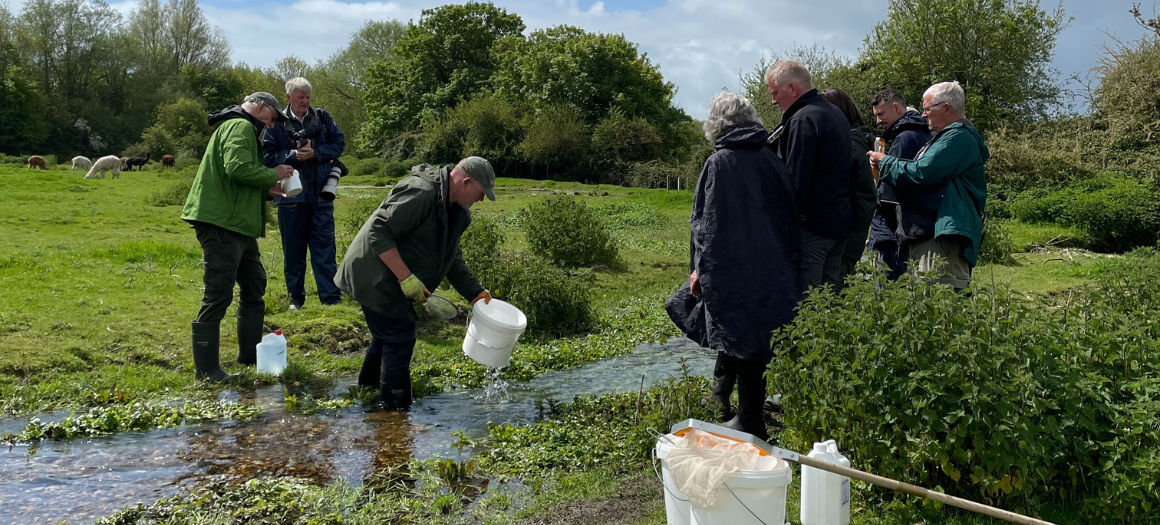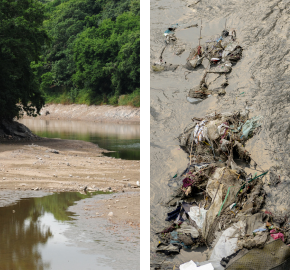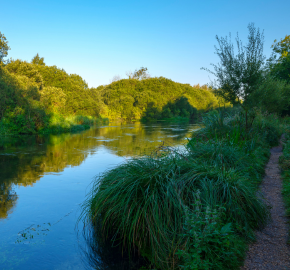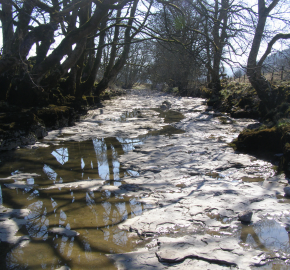Running dry

One of the world’s most remarkable ecosystems, the River Ems chalk stream is at risk of disappearing.
Chalk streams are diverse habitats. Famous for their mineral-rich water, they support a rich variety of water-dependent wildlife, but they are in trouble. 85% of the world’s chalk streams are distributed between Dorset and East Yorkshire – we have a responsibility to protect them.
Hung out to dry
The River Ems supports a wealth of wildlife including trout, watervoles and eel (listed as critically endangered on the IUCN Redlist for Threatened Species). Having once had the strength to support five water mills, the river has now become a shadow of its former self. In fact, you would be lucky now to see the river flowing its full length all year round.
A number of pressures have accelerated the river’s decline:
- Excessive removal of water
Portsmouth Water continue to remove water from the river’s aquifer (a body of permeable rock that contains and transmits groundwater) faster than can naturally be replaced. Climate change has the capacity to reduce rates of replenishment even further meaning the levels of water removed from the aquifer are set to increase.
- Channel modification
River channels are often straightened to reduce the risk of flooding. Modification of the channel causes the water to flow faster so that it speeds past the vulnerable area. This often just moves the problem from one place to another and has a detrimental impact on the natural processes of the river system.
- Eutrophication
A process in which the environment becomes enriched with nutrients. The resulting algal blooms starve water-dependent species of oxygen and often result in large fish kills.
Saving the Ems
A local community group, known as Friends of the Ems, is fighting back to save their river. Actively lobbying for better protection of this well-loved chalk stream, founding member Sandy Galloway said this about the crisis facing the Ems:
The biggest problem is excessive removal of water from the local aquifer. Licensing in 1962 and modifications since have worsened this. After discussions with Portsmouth Water and the Environment Agency (EA) in 2020 we are still waiting for a reduction plan that addresses the problem. There is a reliance on augmentation to maintain flow in the river which is ineffective. The river now dries up in places during the summer months.
Putting the science into citizen science
Statutory monitoring, to understand river health, continues to decline. SmartRivers provides a platform through which local communities can collect data to fill this gap and highlight the struggle rivers are facing across the UK.
Friends of the Ems is one of our newest SmartRivers hubs. The local volunteers have joined forces with the programme to build on their existing knowledge as they continue to build the evidence base to support the changes needed. The river sites are being professionally benchmarked this year and the volunteers have started training so that they can start independently monitoring in spring 2024. The SmartRivers data will help inform local restoration and management by measuring:
- Biodiversity records
SmartRivers sampling produces invertebrate (river insects) species records, these allow the group to assess changes in invertebrate diversity and abundance, a reduction highlights areas of the river at risk.
- Water quality scorecards
Produced by the invertebrate species lists, the water quality scorecard scores each river site for the impact of organic pollution, nutrient enrichment, sediment, chemicals and flow stress. This helps to identify pressure pinch points in the river system.
Excessive removal of water from the River Ems: the facts
Over-abstraction (the process of removing more water from a river than can naturally be replenished) is identified by water companies through a process known as ‘environmental destination’.
Portsmouth Water is undertaking this investigation on the River Ems. The water company has told us that if it were able to conclude its investigation within the first two years it should be able to make a reduction to the amount of water is removes from the local aquifer between 2030-35. If the investigation is concluded after two years, the reduction will be delayed until 2035-40.
Rivers like the Ems need an alternative solution to water supply now not in 10 – 15 years’ time.
The Environment Agency has recently reported that Portsmouth Water’s removal of water from this local aquifer not only impacts the Ems (80%) but also the River Lavant (8%), Bosham Stream (2%) and another abstraction point (10%). It begs the question; will Portsmouth Water also need to conclude investigations on the other rivers impacted before it is in a position to make the changes so desperately needed to save the Ems and others like it?




Excellent, thanks for all your support.
Hi there.
I have recently been talking with Sarah Hughes from the rivers rmtrust about getting involved with the smarteivers monitoring on the River Ems. I would love to hear and get involved with training. Many thanks Jon Keynes
Hi Jon, thank you for your email and interest in SmartRivers. Please email smartrivers@wildfish.org to speak to our SmartRivers project manager about how you to get involved.